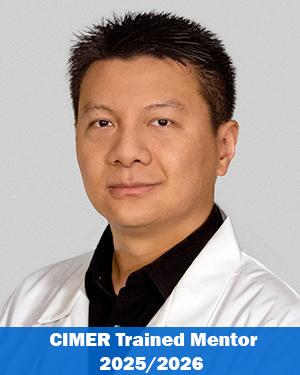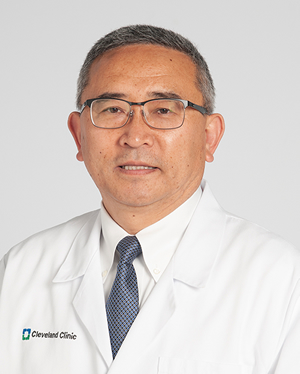Research News
11/18/2024
Discoveries about herpes virus that causes cancer to fuel new vaccines, anti-virals
Drs. Jae Jung and Jun Zhao were awarded $8.3 and $2.3 million each to learn how a herpesvirus causes cancer with the goal of making a herpes vaccine and antiviral.

Almost one in five cancers are caused by viruses. To prevent and cure these cancers, treatments must stop cancer-causing infections as well as the resulting tumor cells. Two Cleveland Clinic researchers were awarded a combined total of $10.6 million to lead this fight against Kaposi’s sarcoma-associated herpesvirus (KSHV), a herpesvirus that causes cancer.
The researchers, Jun Zhao, PhD, and Jae Jung, PhD, will work together and separately to understand every step of how the virus infects our cells, how it establishes a lifelong presence in our bodies and how the herpes virus can cause cancer. This knowledge will support treatments that can cure the cancer in infected individuals, antivirals that can eliminate the herpesvirus before cancer develops and vaccines that can prevent infection and cancer altogether.
How can herpesviruses cause cancer?
KSHV causes Kaposi’s sarcoma and lymphoma, partly by hijacking our proteins to reshape our cells’ metabolism. Dr. Zhao discovered how the virus fundamentally fuels the dysregulated cell growth and division, which can eventually become cancerous and form tumors.
KSHV is common, but most people who are infected never experience symptoms or go on to develop Kaposi’s sarcoma. They don’t even know they’re infected with KSHV because their immune systems keep the virus in check. However, if someone becomes immunocompromised or if our immune systems weaken with age, the virus can “wake up” and change the infected cells including metabolic pathways, ultimately leading to cancer.
“The Kaposi’s sarcoma-associated herpesvirus is basically like a parasite to its host; it has limited metabolic functions of its own, so when it’s ‘awake’ it needs to take over our metabolic pathways to make the materials it needs to survive,” says Dr. Zhao, who runs a lab at the Florida Research & Innovation Center. “In the end we want to determine if blocking specific metabolic activity can be effective to eradicate tumors and ultimately cure people with KSHV-induced cancer.”
The NIH awarded Dr. Zhao $2.3 million to further investigate how Kaposi’s sarcoma-associated herpesvirus physically hijacks a host cell-cycle related protein that Dr. Zhao had previously identified as the driver of metabolic changes and unrestricted growth.
“This specific host protein favored by KSHV is involved in many different cancers. Cancer-causing mutations that affect it may induce similar metabolic reprogramming to what we see with KSHV,” Dr. Zhao says. “It’s very possible that the mechanism we are studying can help bridge what we found in KSHV to non-viral cancers.”
How can herpes infections last a lifetime?
Once you’re infected with a herpes virus, you have it for life – even if you don’t show any symptoms. This is because the viruses have evolved ways to prevent our immune systems from recognizing and killing them. The most our immune systems can do is to suppress the herpesvirus and keep it dormant.
The best way to protect infected individuals from developing cancer is to wipe the virus from our systems entirely. That’s where Dr. Jung comes in.
“Theoretically, if we can make a medication that stops herpesvirus, such as KSHV, from getting the nutrients it needs to survive in our bodies, we can completely wipe the virus out of our systems before it can cause the cancer to form,” says Dr. Jung, who holds the Betsy B. deWindt Endowed Chair in Cancer Biology.
Dr. Jung is the Associate Chief of Emerging Science & Technology, department chair of Cancer Biology, the program director of Infection Biology and the director of the Sheikha Fatima bint Mubarak Global Center for Pathogen & Human Health. He led the team that discovered exactly which metabolites KSHV needs in our cells to make for survival.
Dr. Jung received a $3.4 million dollar grant to uncover finer details of how the virus is able alter our metabolic proteins so our cells can make these nutrients. The research is the first step in making antivirals — metabolism-blocking drugs that would stop Kaposi’s sarcoma at its virus-induced roots.
Making a KSHV herpesvirus vaccine to protect the uninfected
Dr. Jung is also working to protect people from ever getting infected in the first place. He was recently awarded $4.9 million in NIH funding to develop a vaccine platform for KSHV. His vaccine research program has two goals: to make viable KSHV herpes vaccines, and to make viable preclinical models to test those vaccines. He has already published a paper outlining his lab’s work to make a proof-of-concept blueprint for their project.
Dr. Jung has substantial experience in vaccine development and has directly and indirectly trained many scientists – including Dr. Zhao and Dr. Zhao’s mentor before him.
His lab is working to develop three different types of vaccine platforms: they will design new vaccines using mRNA lipid nanoparticles and protein nanoparticles, and they will modify the preexisting measles, mumps and rubella (MMR) vaccine to incorporate KSHV proteins. The vaccine that performs better will be pushed for further testing and, eventually, clinical trials.
“Between my lab’s anti-virus efforts, our vaccine research and Dr. Zhao’s anti-cancer research, we hope someday soon Kaposi’s sarcoma and its associated herpesvirus will be things of the past.” Dr. Jung says.
Featured Experts
News Category
Related News
Want To Support Ground-Breaking Research at Cleveland Clinic?
Discover how you can help Cleveland Clinic save lives and continue to lead the transformation of healthcare.
Give to Cleveland Clinic
